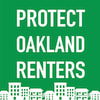Facts About Measure Q
Oakland has a housing affordability crisis. Oakland is falling short of its need for affordable housing. Rents have risen and nearly 40% of Oakland tenants are “rent-burdened,” which means they pay more than 30% of their income in housing costs. When tenants cannot afford their housing, they are evicted, displaced, and can end up homeless.
Social housing can help. Social housing is housing that is built to be affordable long-term to lower income tenants and is publicly owned or owned by nonprofits, land trusts, or the residents themselves. More social housing can help alleviate the need for affordable housing. To combat the housing crisis, we need to invest public resources in meeting community need.
Oakland needs a ballot measure to build or acquire social housing because of a state law called Article 34. In 1950, the real estate industry backed an amendment to the California constitution called Article 34. Article 34 passed as part of a racist backlash to desegregation. It blocks cities from adding more public housing unless the city’s voters specifically vote to allow it. As it is still law in California, Oakland is therefore blocked from adding social housing until the voters approve it.
13,000 units of social housing is based on estimated need. In December 2021, a progress report on Oakland’s Regional Housing Needs Allocation (RHNA) requirement from the State Department of Housing and Community Development (HCD) determined that Oakland was falling short in meeting its affordable housing needs. Specifically, Oakland needs to add 13,000 units of low income and very low income housing to meet estimated community needs by the end of the next cycle, ending in 2031.
Oakland City Council supports Measure Q. Oakland City Council voted unanimously in favor of placing Measure Q on the ballot. The measure was authored by City Councilmember Carroll Fife.

